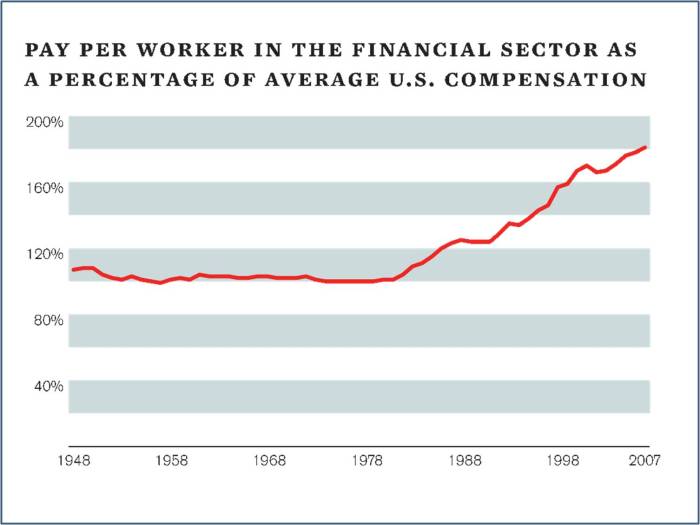Here’s an introduction to and excerpt from The Quiet Coup, courtesy of Simon Johnson and James Kwak, at The Baseline Scenario. – Ilene
What the IMF Would Tell the United States, If It Could
From 1945 until around 1980, the financial sector was one industry among many in the United States. Then something happened.
People in finance started making more money, jobs in finance became more desirable, financial institutions became more influential, and the linkages between the financial sector and the political establishment became stronger. At the same time that our financial sector became more leveraged and more risky, it also became more powerful. The result was a confluence of interests between Wall Street and Washington – one more normally found behind the scenes of emerging market crises, the kind the IMF is called on to resolve.
Simon and I tell this story – and the story of what happened next – in “The Quiet Coup,” an article in the May issue of The Atlantic. (Many thanks to The Atlantic for putting the online copy up as early as they did.) The working title of the article was, “What the IMF Would Tell the United States, If It Could.” Enjoy. – By James Kwak. 
Excerpt from The Quiet Coup:
In my view, the U.S. faces two plausible scenarios. The first involves complicated bank-by-bank deals and a continual drumbeat of (repeated) bailouts, like the ones we saw in February with Citigroup and AIG. The administration will try to muddle through, and confusion will reign.
Boris Fyodorov, the late finance minister of Russia, struggled for much of the past 20 years against oligarchs, corruption, and abuse of authority in all its forms. He liked to say that confusion and chaos were very much in the interests of the powerful—letting them take things, legally and illegally, with impunity. When inflation is high, who can say what a piece of property is really worth? When the credit system is supported by byzantine government arrangements and backroom deals, how do you know that you aren’t being fleeced?
Our future could be one in which continued tumult feeds the looting of the financial system, and we talk more and more about exactly how our oligarchs became bandits and how the economy just can’t seem to get into gear.
The second scenario begins more bleakly, and might end that way too. But it does provide at least some hope that we’ll be shaken out of our torpor. It goes like this: the global economy continues to deteriorate, the banking system in east-central Europe collapses, and—because eastern Europe’s banks are mostly owned by western European banks—justifiable fears of government insolvency spread throughout the Continent. Creditors take further hits and confidence falls further. The Asian economies that export manufactured goods are devastated, and the commodity producers in Latin America and Africa are not much better off. A dramatic worsening of the global environment forces the U.S. economy, already staggering, down onto both knees. The baseline growth rates used in the administration’s current budget are increasingly seen as unrealistic, and the rosy “stress scenario” that the U.S. Treasury is currently using to evaluate banks’ balance sheets becomes a source of great embarrassment.
Under this kind of pressure, and faced with the prospect of a national and global collapse, minds may become more concentrated…



